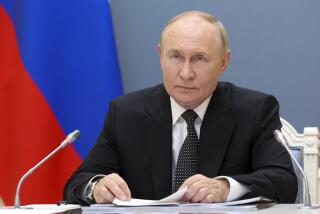Russia aims to reform corrupt police
- Share via
Reporting from Nizhny Novgorod, Russia — He recalls sinking into the darkness of the Volga River, and the icy water in his nostrils, eyes and ears shocking him into one last push for the surface. Above, a jagged hole traced 10 feet of open water, the only such patch in a vast, white expanse.
When Alexei Yakimov broke the surface, his bruised face rested in the snow and the pain shot back into his broken arm and dislocated shoulder. In the distance, he could see his would-be killers struggling up the snowy river bank to their car.
The policemen had a long night with him. They were dead tired, too.
Yakimov’s troubles had started with a dispute over turf among taxi drivers in this provincial capital east of Moscow. One side called in its protection — its “roof” in Russia’s street slang — two drunken cops in civilian clothes, who dragged Yakimov off to the police station.
When they finished with him there, they intended to drop him where no one would ever find him.
It’s a familiar story in Russia, a land where, in the words of reform-minded parliament member Andrei Makarov, the police “are conducting a war against their own people.” A quarter of Russians who answered a recent poll said they had personal knowledge of cases in which police beat or tortured people.
The picture is no better, even according to official police statistics: Internal security reported 125,000 violations of rules or laws by police in 2010 and said that more than 4,000 criminal cases were initiated.
On Tuesday, an ambitious reform goes into effect nationwide. Pressed by President Dmitry Medvedev, the law starts with the organization’s very name. Since the first days of the Bolshevik revolution, when Vladimir Lenin disbanded the hated czarist police and replaced them with a citizens militia, the law-enforcement organization has been known as the militia. Now, once again, it will be the police.
Personnel top-to-bottom will be evaluated; at least 20% of them are likely to be discharged, officials say. Salaries will be more than tripled to ease the temptation to extract bribes, and a meticulous code of conduct will be imposed.
Not everyone is convinced it will make much difference. Many parliament members from Medvedev’s party acknowledge they voted for it against their wishes. Viktor Ilyukin, a member of the parliamentary opposition and former prosecutor, said the problem starts at the very top.
“These corrupt officials will be presiding over the reevaluation process, and they will keep those who suit them best, those who inflate performance stats and bring them bribes every month,” Ilyukin said. Other critics say the police still will serve the interests of Russia’s most powerful.
In Yakimov’s case, his tormentors were a police captain and a senior lieutenant. The pair handcuffed him, chained him to a safe and then took turns smoking and drinking and beating him.
When Yakimov begged for water, they filled a plastic shopping bag with beer, pushed his head into it and tied it around his throat. When they finally took it off and he vomited, they used his body to wipe the floor.
Then, he said, they decided to kill him. First, they tried to throw him out the window, but he fought too hard and screamed too loud. Next, they took him down to the river. When he begged for his life, they laughed.
“Do you think you will be the first?” he recalls one of them asking. “Why don’t you shut up and enjoy your last breaths?”
But Yakimov survived to see them prosecuted. While waiting for the trial, he faced threats of reprisals, a failed attempt by armed men in masks to arrest him, and what he suspects was an effort by another police officer to kidnap his 8-year-old daughter.
A little more than a year after his run-in with the two police officers, he saw them in court. They were found guilty of abusing their office, and each received a three-year sentence.
Yakimov’s arm was so badly mangled that he can’t drive anymore. Instead, he runs a small manufacturing company, and he’s running for the regional parliament.
“People are more afraid of the cops than they are afraid of criminals and thugs in the streets,” he said. “They are into every racket that exists in town and in the region: they control drug-trafficking and prostitution, they control markets and small businesses, and they are corrupt as hell.”
As horrifying as Yakimov’s story is, Igor Kalyapin says there are many worse ones that have been hushed up by police. “Victims and witnesses were scared into silence, blackmailed or bought and complaints were taken back, the charges dropped, and the cases closed down,” said Kalyapin, head of the Committee against Torture, an interregional group based in Nizhny Novgorod.
A casual look at Russian newspapers or television news reveals stories about police raping a schoolgirl, shooting randomly at supermarket customers, beating a professor and an old woman, torturing children.
The legislation makes some effort to change that. All police will have to reapply for their jobs and pass a stringent screening process, said Vladimir Kolesnikov, deputy head of the Security Committee of parliament’s lower house and a former first deputy interior minister.
“Only the hardest working, the most active, honest and talented will remain,” he said. Average salaries will go from the equivalent of about $500 a month to more than $1,500.
“The new law will improve the police performance, as we wrote everything down for them in meticulous detail,” he added. That includes how police officers identify themselves, and how they use handcuffs and other equipment.
As far as Kalyapin and other critics are concerned, police violated the old laws at every turn and will violate the new one too.
Artyom Kubyshkin, researcher with the Union of Solidarity With Political Prisoners, who has been monitoring crimes committed by police, said they had become more brutal in recent years because many had been assigned to take part in operations in Chechnya, or deployed by regional authorities to disperse peaceful demonstrations.
“Our law-enforcement organs are seriously littered with scum and losers of all kinds, who join the police ranks to get in a position of power and a gun in the hand,” said parliament’s Ilyukin, first deputy head of the lower house’s Committee on Constitutional Legislature. “The use of the police for political purposes suppressing the opposition, degrades them morally even more.”
In the meantime, high-ranking police have done very well for themselves.
Early in January, police Lt. Gen. Alexander Bokov, who was in charge of cooperating with former Soviet republics in combating organized crime, was arrested for extorting $46 million from a businessman. An investigation revealed that Bokov lived in a four-story mansion near Moscow filled with collections of guns, jewelry, antiques and art. He also owned at least five apartments in downtown Moscow and real estate in Cyprus and London.
This month, federal authorities reported breaking up an illegal gambling ring in the Moscow region that was protected by at least three top-ranking officers of the regional police and influential regional prosecutors.
“The fundamental problem of our police is that they serve the state, and by the state we mean bureaucrats in power in Moscow, in regions and towns, who are ready to close their eyes on their daily frolics,” said Kalyapin. “The Kremlin needs this law to manipulate the society, to raise the prestige of the police without changing the system under which the cops protect those in power, but not the people. “
More to Read
Sign up for Essential California
The most important California stories and recommendations in your inbox every morning.
You may occasionally receive promotional content from the Los Angeles Times.










